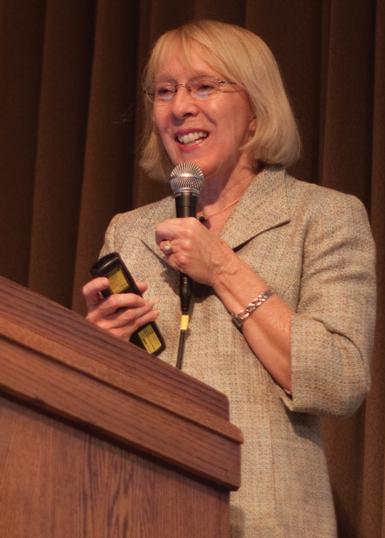Past provides data; humans set future for climate change

Photo: Tsubasa Shigehara/Iowa State Daily
Bette Otto-Bliesner, a senior scientist at the National Center for Atmospheric Research in Boulder, Colo., gives a lecture on Thursday, Oct. 21, in the Sun Room of Memorial Union. Otto-Bliesner addressed how climate change is evolving.
October 22, 2010
The future of Earth depends on the environmental path humans decide to take, said Bette Otto-Bliesner while lecturing on climate change in the Sun Room of the Memorial Union on Thursday.
“What happens in the next few centuries really depends on what we decide to do,” Otto-Bliesner said. “We can make a difference … We have a lot of ingenuity and we’re very smart, but we should be concerned.”
Otto-Bliesner, a senior scientist at the National Center for Atmospheric Research in Boulder, Colo., explained that by using information about the past, we can project different scenarios about what the future climate will hold.
These projections included effects such as surface warming, heat stress and precipitation changes.
“What we’ve observed over the last 30 years is that warming is widespread around the globe,” Otto-Bliesner said. “It’s greater over land than the ocean and it’s greater at high latitudes, in particular in the Arctic region. We expect the amount of warming to continue over the next centuries.”
Otto-Bliesner said the surface warming of the earth has seen a dramatic increase over the last 1,000 years.
“Natural factors affected these variations before there was a lot of human influence on the atmosphere … but what we know if we look at the 20th century is these couldn’t have contributed to the dramatic warming we’ve seen in the last half of this century.”
Heat waves have also increased over the latter half of the century, Otto-Bliesner said. She said humans can survive in heat waves up to 31 C or 88 F, but in the future temperatures could approach 35 C or 95 F.
“This is too warm for extended periods,” Otto-Bliesner said. “We just couldn’t perspire or evaporate enough to exist with temperatures and humidities like this. There were times in the past … that mammals probably adapted to circumstances like this, but it happened over a much longer time scale. Now, it’s happening very fast. It’s quite concerning whether we could adapt or not.”
Otto-Bliesner said periods of high and low precipitation will become more extreme and varied in the future.
In reference to the Ames flood this August, Otto-Bliesner said, “We can’t predict if there’s going to be another flood next year, but we can predict whether it will become more likely to have floods or dry days.”
Barbara Hill, lecturer in geological and atmospheric studies, attended Otto-Bliesner’s presentation and said she was most interested in Otto-Bliesner’s comments about sea level.
“[Otto-Bliesner said] the sea level is going to be different in different parts of the world. I had never really considered that beyond a wind effect. I didn’t realize there was also a temperature effect, and I thought that was really interesting,” Hill said.
Kennard Lai, junior in environmental science, said he found Otto-Bliesner’s lecture eye-opening.
“What if you died, not because of something you did, but something someone did hundreds of years before you, but you suffered the consequences of it?” Lai said. “We are, after all, the inhabitants of this planet, and we should take care of it because it’s our home.”






